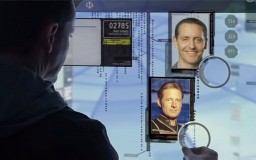Terrible Ending: Man, That Ending. We can give it points for audacity now,
in its stubborn refusal to provide any answers. Instead it dove head-first into the surreality of the show
and never surfaced. And we can give it points for being less conventionally-bad than the endings of many
shows today. (Battlestar Galactica, anyone?)
But then, the traditional function of an ending was expected to be some kind of wrapping-up
of narrative threads, not a load of wilful confusingness that refused to address any aspect of the show other
than the Allegory For Like Society Or Something. No-one was pleased.
Second Series? Hah! After that? No. ...Thankfully, given that McGoohan had clearly run out
of ideas some time before the ending, resulting in a run of largely horrible random filler that didn't even
bother stick to the concept of the series.
Nowhere Man (1995)

Were there no Prisoner rip-offs in the seventies or eighties? Really? I can't think of any,
but unborn and small-child version of myself probably wouldn't have known about them at the time.
Small-child version of myself was rubbish.
There was the X-Files before this I suppose, but whilst the X-Files's conspiracy elements surely inspired the
commissioning of Nowhere
Man, the paranoid stuff isn't really at the heart of X-Files,
so it doesn't really count by itself, according to our panel of judges. Sorry, the X-Files...
please do not call our panel of judges a conspiracy. They're really very nice.
Nowhere Man's Prisoner pilfering was particularly evident in several episode plots, and
explicitly acknowledged by creator Lawrence Herzog. Co-producer Joel Surnow you've
probably heard of, as he'd go on to create 24... a show with a quite different attitude to
whether it was a good thing for a secret government organisation to infringe on one's
civil liberties.
Everyman Protagonist: A photographer takes a picture of some military
naughtiness, as you do, and gets erased—everyone he knew claiming not to know him—as a result.
The “why did you resign?” macguffin becomes “where are the negatives?”.
John or Meaningful Name? Meaningful Name. Veil, like a veil, hiding
something! A-ha ha.
Them: A non-specific Organisation, seemingly
US military/government. Maybe the previously-obscure cigar-smoking branch.
Army, Navy, Air, Cigar. It's a man's life in the modern Cigar-Smoking Force.
See the world... engage in unnecessarily convoluted plans to get hold of some
meaningless negatives... contract lung cancer.
The Village: is the US in general. Veil gets to run about the country but all of it
appears to be under the Conspiracy's control. Pretty much everyone seems to be in on it,
working with Them on assorted crazy schemes. You'd've thought it would be quite hard
to keep a conspiracy of this sheer size secret.
You can tell when there are Them around, because things fall
over suddenly and distractingly for no reason. Other than that, being set in real America limits
the possibilities for flamboyant futuristic weirdness. Nowhere Man's largely bland US locations
lacked The Prisoner's sense of style.
Pretty Lady episodes: Turnabout and Something About Her.
Plus of course Mrs Protagonist's-Wife betrays him pretty much every episode. Those ladies, and their
treacherous female reproductive organs!
Terrible Ending: so over the final few episodes the answers pulled out of the
scriptwriters' arses were: the photo was a fake planted by the Organisation; the Protagonist's Wife
and friends were fakes planted by the Organisation; the Everyman Protagonist's memories were
fakes planted by the Organisation.
Quite why the Organisation would, having already caught and fully-brainwashed Everyman Protogonist, cook up
a bizarre life-erasure scenario, release him, and then spend months and absurd amounts of resources
chasing him around the country screwing with his mind, to get back the fake but still potentially-damaging
negatives that they gave him in the first place, is left as an exercise for the viewer.
Especially since throughout the rest of the series the Organisation are happy to use the ‘murder’
solution as almost the first resort to any problem. Veil even asks the Bad Organisation Man pretty
much this question, to which the reply is little more than a shrug and “well, it seemed like a laugh”.
That's yer resolution, folks! Thanks for watching! Buy the DVD!
“Question everything!” and “Everything you believe is false!” are all very well, but when everything
the series has portrayed is untrustworthy, when the conspiracy has controlled every supposed clue
from the start, why do I care about any of it? The answer “The Conspiracy did it!” for every question
is no more satisfying than Battlestar Galactica's infamously lame “God did it!” ending. The Conspiracy
already seem to be as powerful as God anyhow.
Second Series? What would be the point, now the narrative has declared itself
meaningless?
The Truman Show (1998)

Yeah, it's a film, not a TV series. I'm allowed, it's in the rules. I checked.
Everyman Protagonist: Truman Burbank, trapped in a live reality show of his own life since
before he was born. A show that is apparently incredibly popular despite what must have been an initially
shaky first few years of nothing but sleeping, crying and pooing from Everyman Protagonist. I guess 24 hours
of close-ups of soiled nappies and wailing is still better than the X Factor.
John or Meaningful Name? Meaningful Name. Truman, like a true-man! It's subtle and clever! Ahahaha.
The Village: Seahaven, a whole town in a great big dome with its own lighting, weather, economy
and media, at vast cost. Ratings must be pretty phenomenal... I mean,
Channel 4 apparently can't even make Big Brother profitable any more, and that's just some cheap gits in a bungalow.
Them: absolutely everyone in the town, led by Lightly Evil But Dedicated TV Producer Christof.
Pretty Lady episodes: None. No episodes. It's a film, not a series.
His wife's not very nice though, eh.
Terrible Ending: Truman becomes suspicious, tries to escape, and successfully escapes, in quite
quick succession. If only Number Six had it that easy, he'd have been much less cross. Personally,
I always found The Truman Show a bit short and slight, barely scratching at the possibilities of the
concept. It's a decent film, but I had hoped for more.
Second Series? I don't think a Truman Does The Rest Of The World sequel would
be very interesting, no.
Dark City (1998)

Also not a TV series, but 1998 was a fine year for paranoid film. Dark City is an excellent and
underrated film containing equal parts of film noir style, sci-fi plotting and paranoid fantasy
prison.
Everyman Protagonist: John Murdoch, literally a blank slate due to
a memory implant gone wrong.
John or Meaningful Name? John.
The Village: an anonymous city perpetually in darkness, which is plastically
re-configured at intervals when the inhabitants sleep. Eventually revealed to be isolated,
floating in space, in one of the film's many fantastic visually striking sequences.
Them: sinister men in sinister hats, who turn out to be sinister corpses
controlled by sinister aliens, who control the sinister city using sinister psychic powers to
screw with everyone's memories. Sinisterly. Well, I didn't think they were very nice.
Pretty Lady episodes: no episodes. And no women betray Everyman
Protagonist during the course of the film. This is not so much a refreshing feminist viewpoint
as merely a film with only one female character in it.
Terrible Ending: yeah, this, too, goes a bit dodgy at the end. It turns
out the aliens just want to find out Why Humans Have A Soul, to cure their being a Dying Race and that.
That's what you do when you're a Dying Race, find a race that's living and make a lot of them die.
That really helps in fixing your own medical defects. It's science. Oh, and then
the Them are defeated in a big mind-fight because Everyman Protagonist actually has super powers
and is more strong and noble and Just-Better-OK than Boss Alien.
I guess it still works reasonably effectively, and the super-powers are at least properly set up
in advance, but it's still a little bit Hoary Old Sci-fi plot in an otherwise thoughtful and inventive film.
Second Series? No sequel, or indeed any other film a bit like it. And
nothing else Alex Proyas has done before or since has interested me at all. Huh.
The Prisoner (2009)

AMC's brief mini-series—eventually shown in the UK by ostensible co-producers ITV this year—is
a remake of the 1967 Prisoner in name only. It takes surface details of the original to produce
something that feels completely unlike the original. It's a beautiful-looking
but ultimately slow and somewhat pointless series.
Everyman Protagonist: Number Six, again, only a duller, less charismatic
version. Still quite cross though.
John or Meaningful Name? No. Number Six is in reality called Michael.
Whilst I could claim the literal meaning “like God” was a Meaningful reference to what happens in the end,
that's pushing it a bit. Really, AMC, this is no good. Do it again and come back when the
chap's called John Freeman.
The Village: The Village, but in Namibia instead of Wales. However,
what Swakopmund shares with Portmeirion is an atmospheric visual distinctiveness.
Them: an evil corporation. As it must be in any modern plot. Only...
then, in the end, they're actually a good corporation, running the
Village as a kind of free psychotherapy service for completely random people? What?
I'm sorry, Summakor, but I don't see how that's even profitable, never mind legal.
I'd love to see you justify this one at the Annual General Meeting.






















